Life Skills programs offer a strong foundation in supporting people to successfully transition into community life.
Thrive

Thrive is an innovative adult day program for individuals over the age of 18 with developmental disabilities. Thrive provides a strong foundation in supporting young adults to successfully transition into community life and the goals that are most important to them, including education, employment or independent living.
This year Thrive staff participated in a focus group around their experiences with the Thrive program. Waking away from the focus group staff were experiencing a higher level of group cohesion. As reflecting on their experiences reaffirmed staff understanding of the engagement across programming from staff and participants built a virtual community that was mutually beneficial for everyone’s wellbeing.
.png.aspx)
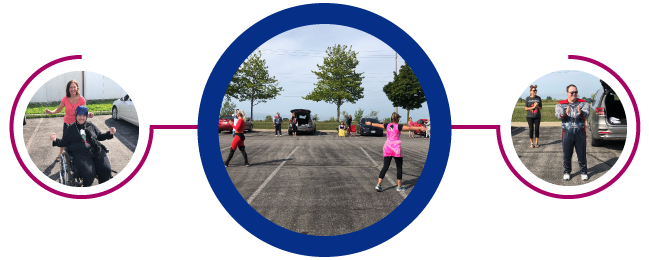
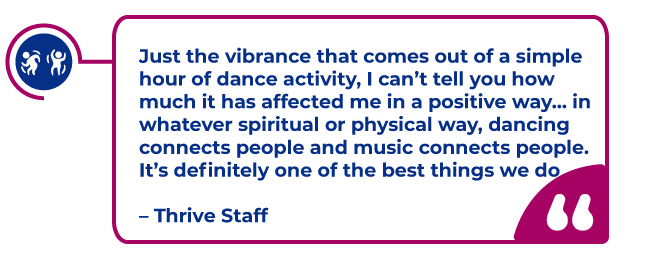
During virtual Thrive programming participants were actively engaged. On a scale of 0-100 average engagement/participation ranged from 70% - 80%. Highest level of engagement was reached in Sport and Recreation programming.
COVID-19 Challenges and Program Impact
Thrive program has transitioned over the past year to a completely virtual platform as well as a combination of in-person and virtual platform, including outdoor parking lot programming.
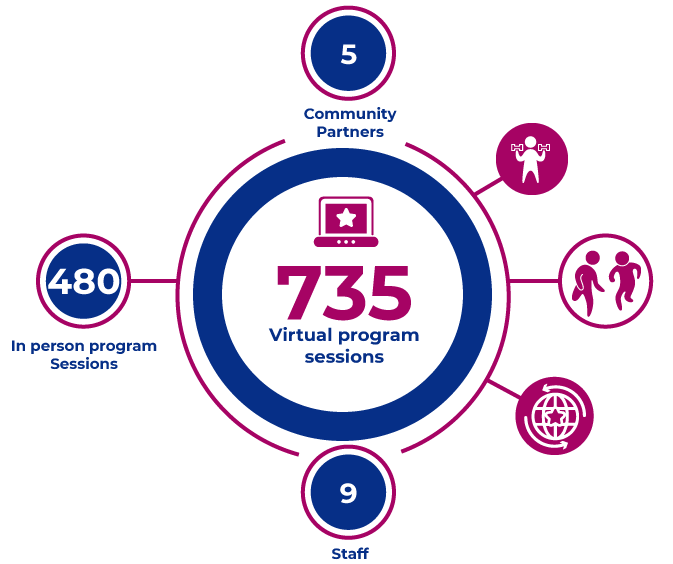
67-70 Thrive participants are part of the Thrive program with 47 Thrive Participants actively engaged in programming at any time due to the Pandemic
/Thrive-letters-(1).png.aspx)
ASAD and Thrive – Pen pals
Thrive and ASAD programs have been missing their daily interactions, and in response to this Abilities Centre staff developed Thrive and ASAD Pen Pals! Feedback from the staff and participants have been extremely positive.
Thrive and The Academy for Student Athlete Development ASAD have been successfully running ‘Include You’ for two years, a combined activity between the two programs. Include You is an integrated program that encourages meaningful participation with Thrive and ASAD, fostering a sense of belongingness, creativity, social and physical participation amongst student athletes and Thrive participants. With the COVID-19 pandemic, participants from both Thrive and ASAD programs have been missing their daily interactions, and in response to this Abilities Centre staff developed Thrive and ASAD Pen Pals! Feedback from the staff and participants have been extremely positive.
![pen-pal-quotes-(1).png Participant quotes in a magenta bubble: [participants] kept asking when they would get another letter and if they could meet their pen pal virtually enjoyed reading their pen pal letters and were really excited to get to know their pen pal more - Participant "It made their day and was exactly what they needed to read in order to improve their day and state of mind" - Participant](/getattachment/Our-Impact/Impact-Report-2020/Post-Rehab-and-Employment-(1)/pen-pal-quotes-(1).png.aspx)
Over the past 6 years Abilities Centre has worked/partnered with Ontario Tech University’s Health Sciences department to tutor a research practicum student. This years project was titled ‘Analyzing the Efficacy of the Thrive Program to Promote Joy in Participants: A Mixed Methods Study’.
Participants demonstrated increases in Quality of Life, General Self-efficacy, Decision Making, Physical & Emotional Joy.
What Fostered Joy?
- Intentional program engagement
- Smiles and laughter
- Relationship development
Why measure Joy?
- A construct used as an indicator of quality of life, health and well-being, and sense of inclusion or belonging
- Identified by programming and research as an accessible and measurable construct for a population that has very few quantitative measures developed for it
Read the full report
Pathways
/Pathways-title-(2).png.aspx?lang=en-CA)
Pathways is a 12-week, pan-disability program that focuses on independence, community engagement and skill development for participants. Abilities Centre partnered with individuals that contribute in a meaningful way to their communities. Community partners discuss how they make an impact in a positive way within their community, providing opportunities for participants to learn about the impact.
Partners include:
- Lakeridge Community Support Services
- Agilec Employment Services
- Whitby Public Library
- Nurses
- Firefighters
- And more!
.png.aspx)
COVID-19 Challenges and Program Impact
Pathways program’s intention is to assist participants in building their independence, skills and community connection within the community. However, due to the COVID -19 pandemic, the program transitioned to a virtual model to bring the community ambassadors to the participants through guest speakers, rather than facilitating participant engagement in person in the community.
Virtual program delivery supported the development of skills that would not normally be taught in an in-person format (e.g. enhancing technology based skills, virtual etiquette, increased communication, etc.) Participant independence and communication levels grew in different areas such as learning how to navigate a computer and internet.
.png.aspx)
Testimonial from parent of a Pathways Fall 2020 Participant
Our child participated in the Fall 2020 Pathways program. They was eager to learn and grow from what the program had to offer. Our initial response was that we were skeptical about the online virtual meeting component. You see, our child is not a “computer person” and they was hoping (as was I) for more of an in person interactive experience. Due to the COVID-19 virus and the physical distancing restrictions, virtual meetings have become a reality in everyone’s world. Isolation is an everyday lifelong issue for our loved ones whose limitations are more than most. Our child and so many others like them, have so much wisdom to teach the people of this world we live in. Their value is immeasurable. If only, people would hear and learn with their hearts!
“People with Disabilities can change the world – no in spite of their disability but because of it” – Parker J. Palmer, Author
Pathways has opened up the virtual world for our child. Pathways has taught them about the etiquette surrounding this type of meeting with others. Their virtual experiences have gone beyond pathways, into church gatherings, youth group and video calls with other to having medical appointments online. Although, our child does need facilitation to access the technology and meeting, once set up for them, they is very good at speaking and expressing themself, not afraid to interact. They now see themself as a valued participant rather than an observer.
The pathways staff are exceptional at their job! We are impressed at how well they intentionally engaged the participants. Participants were validated. Their voice was important regardless of whether they could speak articulately or not. I was amazed at how well inclusion, self advocacy and self esteem skills were amplified and carried out in the pathways model. Our child has improved in all of these areas because of pathways.
Thank you to the Pathways staff and community members. You have pushed your participants through their comfort zones. As a result, a doorway open to change and growth in their lives.
Sincerely, Pathways Participant’s Parents |
Therapeutic Recreation (TR) uses community and activity-based programming to improve wellbeing, physical and mental health, as well as functional capacity for individuals. TR specialists use a goal-oriented, evidence-based approach with a focus on recreation and play. This helps individuals to build, learn and maintain life skills, increase independence and resilience, improve quality of life and help participants find what they are passionate about.
Active Connection
Active Connection is a program aimed to engage participants in physical activity, skill building and social connection., dDue to COVID-19 protocols programming was moved into a virtual setting, allowing. This allowed participants to engage in social interaction and physical activity from the comfort of their homes. Full participation was seen throughout program with participants learning how to communicate via chatrooms on virtual platform, weekly challenges related to resiliency and an increase in physical activity involvement and transitioning to other employment and life skills programming offered at the centre.
Thinking Ahead
Thinking Ahead is a program aimed to engage participants in goal setting, life skill building and social interaction Due to COVID-19 protocols programming moved into a virtual setting that had two small group programming being facilitated. The two groups engaged in (client identified and individual goals) social activities, physical activity exploration and connected with community partners to further pursue life skills and physical activity. The program was very successful with both groups continuing onto a second round of program (with the addition of some new participants). One of the groups will be connecting with a local Rugby club to participate in their Mixed Ability Rugby program, and the other will be engaging in a dance activity with a local dance studio. Both groups have goals of meeting each other outside a virtual setting (dependent on zones for Durham region) and we also had a participant confirm acceptance to a CICE program.
COVID-19 Challenges and Program Impact
Therapeutic Recreation programming has remained flexible and fluid moving into and out of virtual programming throughout the pandemic. Depending on provincial restrictions programming is run either virtually or in-person through 1:1 and small group programming.
AC programing, including Therapeutic Recreation programs, focuses on capturing ‘Spark Moments’ which are the hidden flames in individuals that excite them and tap into their true passions, what motivates, inspires their authentic passions, talents, assets, skills and dreams. Spark moments can be musical, athletic, intellectual, academic or relational.
*Benson, P. 2011, April 22, TEDxTC – Peter Benson – Sparks: How Youth Thrive. (video).
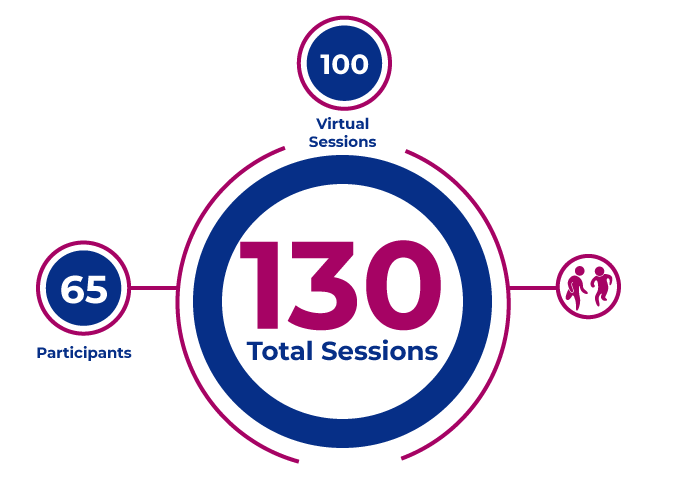
Therapeutic Recreation In Schools (TRIS)
The goal of the TRIS program is to support students with disabilities to build, learn and maintain life skills, increase independence, and improve quality of life. Additionally, the Therapeutic Recreation Specialists work with educators in schools to support students with disabilities to develop soft skills that directly impact resiliency & ability to deal with positive & challenging change, including transitioning to high school and preparing for a successful graduation.
I Can Change The World With My Own Hands activity was used to encourage participants to make the world a better place. Participants were asked to write about a positive change they would make to the world.
The TRIS program is based on the principle that students of varying abilities can set and achieve goals while learning new skills to cope with future adversities using their own personal resources or ‘SPARKS’
7 delivery sites/schools (new and existing)
- Port Perry HS
- GL Roberts HS
- Uxbridge HS
- Brock HS
- J Clarke Richardson HS
- D.A. Wilson HS
- Ajax HS
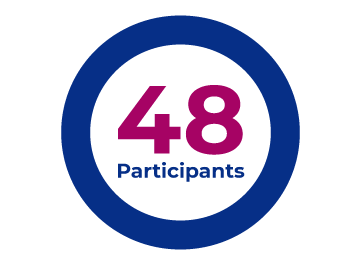
The following comments are taken from an unsolicited comments created by one of the TRIS classes that participated in the program, send as a ‘Thank you’
" A huge thank you to Nicole, Jamie, and all the AC Staff!"
From Mrs. H.
"My favourite week of the TR Program was Hopes and Dreams because it taught the students to think ahead and to have goals and dreams no matter how big or small. Some of them do not have those ideas and this was a good start.
One thing that you taught me was that we are all learning at all ages. We are in this together and can all learn from each other."
From S.
"My favourite week of the TR Program was hopes and dreams because I like to write about things that make me smile and things I want to do when I grow bigger and get older.
One thing that you taught me was that i had a vision in life."
From A.
"My favourite week of the TR Program was leadership because we learned leadership skills to do teamwork and never give up and to work together.
One thing that you taught me was to be a good leader and to never give up and leading a good team to do good teamwork.
Thank you for helping me learn these."
From R.
"My favourite week of the TR Program was self regulation /emotions because to show how your feeling. Im feeling happy
One thing that you taught me was how to be grateful and helping me with things.
Thank you for always teaching us a lot of things and making us feel happy all the time." |
Back to Homepage
Next section